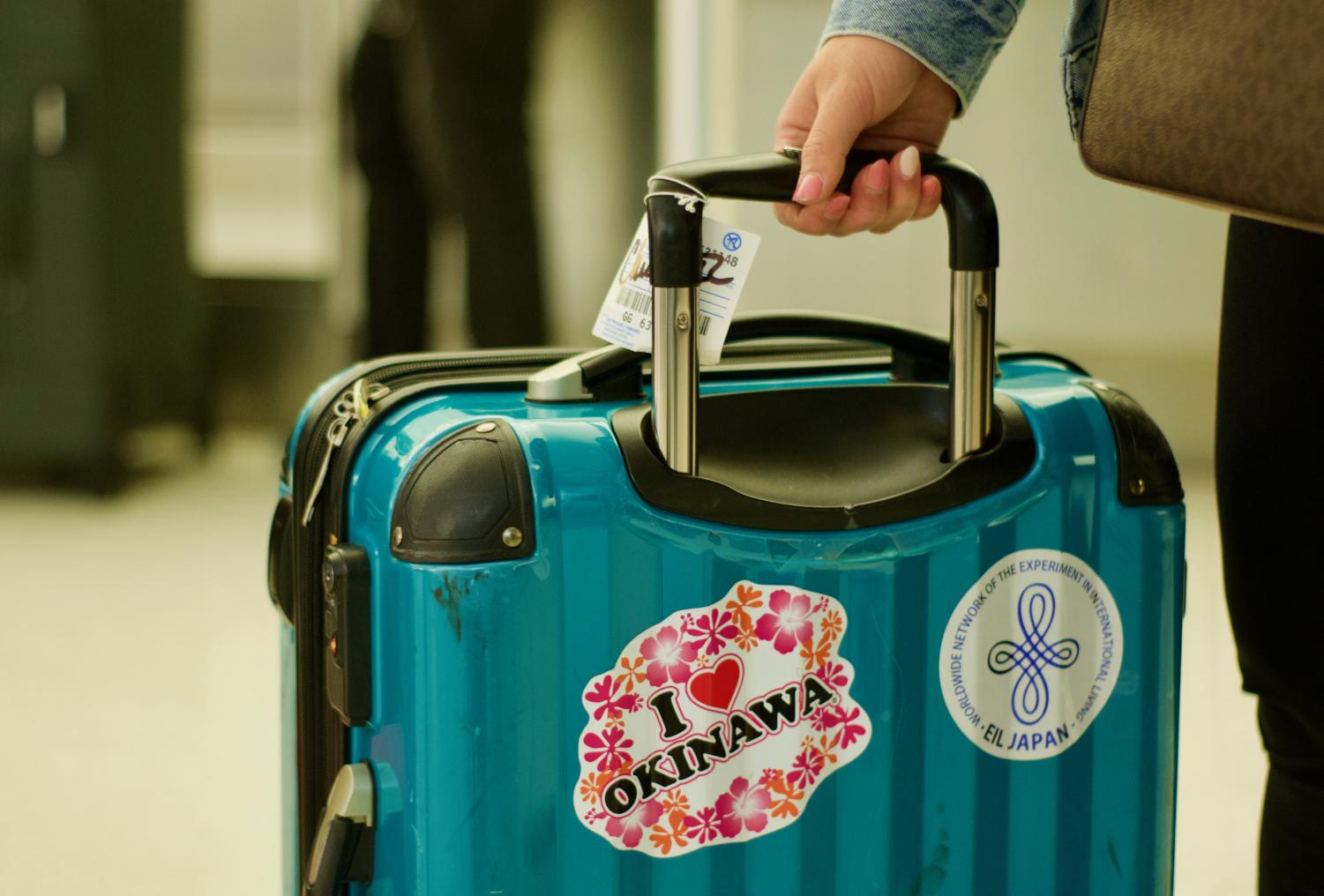Your donation will support the student journalists who produce Lindenlink. Your contribution will help to cover our annual website hosting costs.
COVID-19 university and border closures leave international students in confusing situations
April 8, 2020
Three Lindenwood students got stuck for 30 hours in an Amsterdam airport and had to make a video that pushed their government to help them get back home.
Another student is currently in limbo in New York City, unable to return to Lindenwood or to his home country.
With Lindenwood’s campus closing and countries throughout the world closing their borders to stop the spread of COVID-19, many international students have ended up in uncertain situations.
Junior Oyku Evliya said that when she went home to Turkey for spring break, she never imagined she would not be able to come back to school due to a pandemic.
She left for break with just a suitcase. All of her personal items, including some that were special, remained in her house on campus.
Residential Life told Evliya she had until May 1 to get her belongings out of her house before maintenance cleans it out for next semester, even if she is already registered to live in the same house next semester. Because of the pandemic, she is concerned that she won’t be able to come back to Lindenwood until August. But since then, Lindenwood has decided that May 1 would no longer be the deadline. Instead, the university will let residents know when and how they can obtain their belongings after campus reopens.
“This whole situation is just horrible and continues to grow,” Evliya said. “I was just worried about my international friends who were stuck in Missouri, because if I was stuck there, I would be so scared, for my family in Turkey and myself.”
Stranded in Amsterdam’s Schiphol airport
On March 18, Branislav Stojiljkovic (Brah-nee-slav Sto-yeel-co-vich), a Lindenwood water polo player, started his journey back home to Serbia with two of his teammates, Nikola Nasev and Andreja Babic (On-dre-a Bah-bihch). But on their connecting flight from Detroit to Amsterdam, the flight attendants said that flights to Belgrade, Serbia’s capital, got canceled.
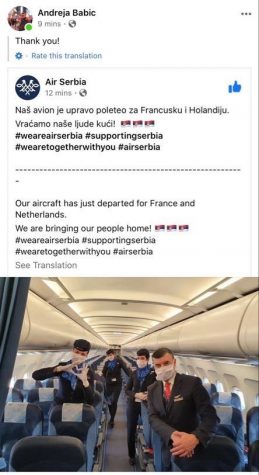
“After that, we called our embassy to seek some help, and they said that the only way to get home is to hope that the government sends a plane,” Stojiljkovic said.
An official at the Serbian embassy recommended the students quarantine themselves in the Netherlands, as they said finding a flight back to Serbia was “almost impossible.”
So, the students decided to record an Instagram video to seek help from their government.
Babic said their video had almost 70,000 views and 1,500 shares. Serbian newspapers started to get in contact with the student-athletes. Marija Šerifović, a Serbian singer, and Bane Opačić, a composer, shared the students’ video on their social media accounts.
Stojiljkovic and his teammates waited at Amsterdam’s airport for over 30 hours before a plane from Serbia’s government finally got them.
“There was only one shop to get food and drink, but it was only a matter of time for that shop to close,” Babic said. “We managed to move to some lounge and we had a couple of hours of sleep.”
He said in the morning the airport was full again, and everything went back to normal. Then, the airplane from the embassy arrived.
“Once we came back [to Serbia] we were very happy,” Babic said.
The waiting game in New York
Benedek Horvath, another student on the water polo team, decided in February to surprise his family by visiting them in Hungary during spring break.
Before his trip, only a few coronavirus cases were reported in Europe outside of Italy. Horvath tried to cancel his flight but couldn’t, so he took the trip, he said.
“I arrived home, nothing special, I made my family cry, explored my own city as a tourist, went to see my sister’s water polo games, went out to clubs,” Horvath said.
But on March 9, Hungary announced a state of emergency.
The next day, universities in Hungary were closing as well as banning gatherings of over 100 people, Horvath said. On Wednesday, he woke up in the middle of the night and happened to check his phone.
“Five or six of my Lindenwood friends were texting me; my best friend who goes to Louisville was calling me,” Horvath said. “I answered and he was the one who told me that Trump banned all flights [from Europe] starting that Friday.”
Horvath said he immediately got in contact with his aunt who lives in New York City and tried to reschedule his Saturday flight to come back to the U.S earlier. His aunt then pre-booked a direct flight to New York that same day at noon.
“I had to wake my parents up at 6 a.m. to tell them the situation, and that we had five minutes to purchase a ticket,” Horvath said. “Four hours later, after three rounds of panic attacks, I was at the airport. This was my sixth time going away for a long time, but the first time I was actually crying on the shoulders of my mom and sister.”
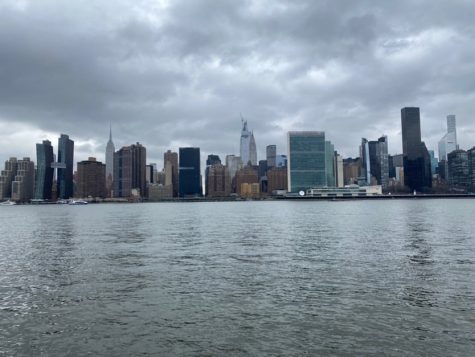
Photo from Benedek Horvath
When Horvath arrived in New York, he saw a text from his boss, Holly Zeiger, saying that he was not going to be able to come back to campus until after two weeks of self-isolation, he said.
Horvath was a student employee working as a community advisor in Guffey Hall.
“Panic attack number four,” he said.
He looked at the news the next day and read that schools were closing and going online full time.
“I was begging my boss to try to let me come back for 30 minutes to pack my stuff,” Horvath said. “She tried, but they [school] didn’t let me.”
Horvath had only five T-shirts with him, so Zeiger offered to pack a luggage case with his clothes and send them to New York. The rest of his belongings are still in his dorm room. Horvath said he hopes that he will be able to leave the rest of his items in his dorm since he was a CA.
“Like everyone else, there was so much that I didn’t know, that I couldn’t know,” Zeiger said. “I couldn’t tell Benedek or any of my students how to get home, what was or wasn’t safe, or when they would be allowed back on campus, but I could pack up a suitcase and take it to FedEx.”
Because Hungary closed its borders, Horvath is staying with his aunt and cousins in New York. He said he is healthy and gets groceries when needed, as he is the youngest and has a driver’s license.
He has a flight scheduled to go back to Hungary on April 23, but might be rebooked to a connecting flight to Hungary through Warsaw, he said.
When he arrives in Hungary, he will be placed in quarantine in his home, and he will have to put a red sticker in his door so police can check on him every day, he said.
“This means that for 14 days, I will be on the arrest warrant list, and if the police see me in public, I can get arrested,” Horvath said.
In a discussion for one of his classes, Horvath wrote that “the only way to get through this is together, united as one.”
“This is something I have never ever thought I was going to experience,” Horvath wrote. “But this is going to be the coolest story to tell our kids in the future. Stay safe, everyone, and good luck with all your classes!”
Use the Google map above to see some of the locations and trips mentioned in this story.
Map created by Matt Hampton
“Left out” in the Linden Lodge
After Lindenwood announced on March 16 that students were required to leave campus within six days, the university asked students with “exceptional reasons that require them to stay at Lindenwood” to contact Shane Williamson, dean of students and associate vice president for Student Life and Diversity.
Carmen Reyes, a student from Venezuela, said she emailed Williamson but wasn’t given any answers to her concerns. So on March 17, she posted an Instagram video about her concerns, which got 928 views and was shared 150 times.
Reyes said she felt like Lindenwood did not consider international students in how it responded to the coronavirus.
“When they said only six days it was like ‘Wow, where do you want me to find a home in six days when everything is in crisis, knowing that you will have a campus full of empty houses?’,” Reyes said. “I felt kind of left out.”
Fifteen students were granted hardship requests and were told to move to the Linden Lodge, which is located about three-quarters of a mile away from Lindenwood’s campus, near Walmart and Sam’s on Interstate 70.
“For the safety of the students, we needed to have them all in one building. We have a large campus and it would have been very challenging if students were spread out in houses and residence halls,” Williamson wrote in an email.
Williamson said there were 95 requests to remain on campus across the Lindenwood University system, and a committee approved requests based on “extreme hardship” or for students who could not return home or had nowhere to live. Lindenwood approved 75 requests, but 60 of these students said they no longer needed to live on campus.
There are 12 remaining students, both domestic and international, at the Linden Lodge, Williamson said. An area coordinator is also currently living there.
The students selected to stay at the Linden Lodge were sent an email on March 21 at 8 p.m. to let them know they were relocating the next day between 8 a.m. and 6 p.m. The email also said that students were going to be permitted to leave larger items at the residences, but were not allowed to go back to “access the residence until further notice.”
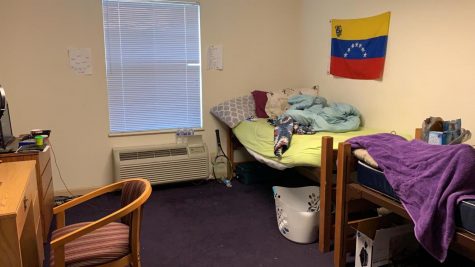
Photo from Carmen Reyes
Most of Reyes’ personal items, including furniture, are still in her house on Glenco Drive.
All students who could not take their items out of their dormitories will be allowed to leave them there until campus reopens, and will be notified of when and how they can obtain their belongings, Williamson said.
Reyes said moving into the Linden Lodge was “terrible and terrifying, especially because of all the circumstances that the pandemic is causing on all of us.”
Kevin Roca, also Venezuelan, said none of the university offices were clear or helpful to international students, and even the Office of Admissions and Services for International Students had limited information.
“I was obviously outraged that in all this situation, the measures they took were not necessarily the best,” he said. “They kept us adrift for days.”
Roca said he also had to make a last-minute decision whether to go home to Venezuela or stay because Lindenwood would not be clear about the cost of staying at the university. Roca is currently staying with his brother in St. Charles.
“Throughout this chaotic and quickly evolving situation, Lindenwood housing staff worked very hard to ensure that our students were kept safe and that no student was left without a place to live,” Williamson said. “We understand that this situation is not ideal for anyone, but we have tried to address the remaining students’ needs to the best of our ability. In addition, the Business Office worked very hard to process students’ refunds expeditiously because we recognize the financial urgency COVID-19 has created.”
Reyes was a student worker at Starbucks on campus and used her wages to pay her own expenses. Now, with Lindenwood not providing food to the students living at the Linden Lodge, Reyes’ parents have had to give her money for food.
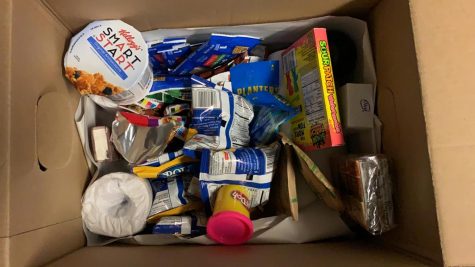
The care package contained around 15 items, Reyes said.
Pedestal Foods and the Little Free Pantry, which is overseen by the Center for Diversity and Inclusion, provided students at the Linden Lodge with a “care package,” according to Williamson. Pedestal Foods also donated lunch meats during the first week.
The care package contained about 15 items, including pretzels, Pop-Tarts, a roll of toilet paper, and Play-doh.
Reyes now faces the decision of whether to go home or stay in the United States. Because there are no direct flights from the U.S to Venezuela, Reyes said she would need to go to Miami, find a flight to the Dominican Republic and then buy a final flight to Caracas.
However, the toughest part is not going back home to Venezuela, but the fact that it is uncertain if she will be able to return to the U.S, she said.
“That’s the worst part of all, there is a 50/50 chance of coming back or not,” Reyes said. “Venezuela is a dictatorship and politically, economically, and socially, it is very [unstable]. Right now, for me, it is impossible to say if I can.”
Unexpected departure
Anna Miyagi was one of the dozens of international students who had to book a flight home almost two months before she originally planned.
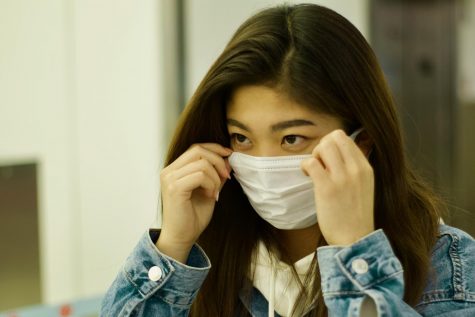
“In Japan, it is common to wear masks when we are sick,” Anna Miyagi said, even though she was not sick and just wearing the mask as a precaution. Every time she went home her mom sent her back to school with masks.
She left campus with two bags: one carry-on and one checked bag. One is hard-backed and teal, with a sticker that reads “I Love Okinawa,” Miyagi’s hometown in Japan.
At the St. Louis International Airport, she slipped her mask on. Her mom always sends her back to Lindenwood with masks, multiple at a time. In Japan, it’s common to wear masks, even if you only have a common cold, she said.
But Miyagi said she doesn’t wear them often because it feels weird to wear them in America. However, she made an exception for the 20-plus hour flight back to Japan during the COVID-19 pandemic.
Kayla Drake contributed to reporting.
Editor’s note: This article has been edited since it was initially posted. A previous version of this article said students in the Linden Lodge have to leave by May 9. While this was originally the date that was announced, Williamson said it will be re-evaluated based on the changing situation, and any changes will be communicated to students. Also, the number of hardship requests approved, and Williamson’s comment that Lindenwood worked hard to keep students safe during the crisis were added at the request of the university.
The following sentence was also added: “But since then, Lindenwood has decided that May 1 would no longer be the deadline. Instead, the university will let residents know when and how they can obtain their belongings after campus reopens. “

